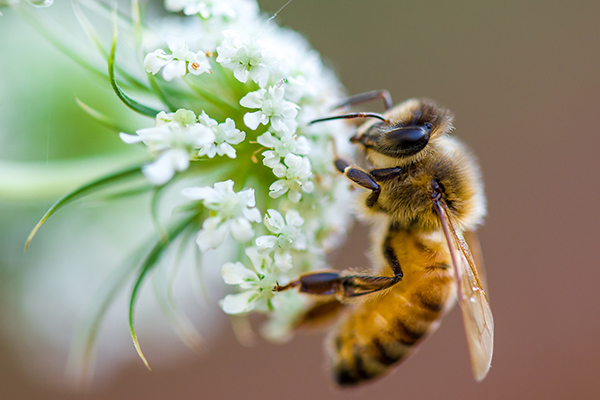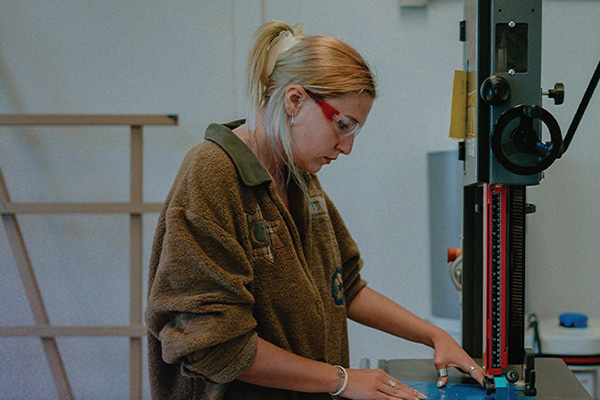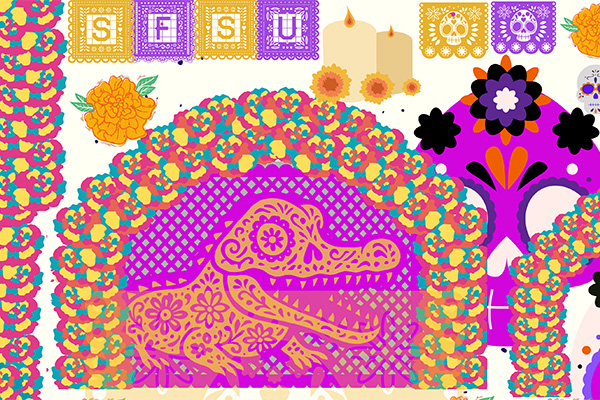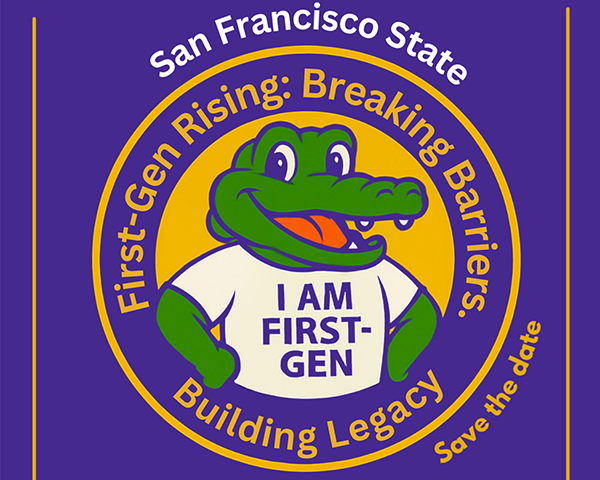News and Announcements

SFSU is now offering a Three-Year Accelerated Pathway to a bachelor’s degree for eligible students, providing an opportunity to graduate a full year ahead of the traditional timeline while reducing overall educational costs.
The Three-Year Accelerated Pathway is designed for incoming freshmen in selected majors, currently including Criminal Justice Studies, History and Race, Ethnicity and Health. The pathway follows the same degree requirements as traditional four-year programs, but students complete courses at a faster pace, including across fall, spring and summer terms. Advisers work closely with participants to ensure the plan is manageable and tailored to individual academic goals. There are ongoing efforts to expand this option to additional majors.
“We find more and more that students are looking for flexibility of options on so many levels,” SFSU Associate Dean of Undergraduate Education Kim Altura said. “Some students want to go to school year-round because they find the summer break interrupts their momentum. This is another way we can package our degrees to be more flexible for students while also providing a clear, detailed roadmap to graduation.”
Key Benefits of the Three-Year Pathway
- Time savings: Students complete their bachelor’s degree in three years, entering the workforce or graduate school sooner.
- Cost savings: Accelerated progress through the degree reduces tuition, housing, and other living expenses.
- Academic credit for experience: The program also considers relevant work experience for academic credit where appropriate, helping further shorten the time to degree.
Who Is Eligible?
This pathway is ideal for incoming freshmen who bring in Advanced Placement (AP) or other college-level transfer credits and are committed to following a year-round academic plan, including summer coursework. Students interested in a structured and detailed path to graduation may benefit most from this program.
Getting Started
First-year students in Criminal Justice Studies, History or Race, Ethnicity and Health are encouraged to connect with their assigned adviser in the Undergraduate Advising Center or the Educational Opportunity and Pathway Programs (EOPP) for EOPP students, to begin building a personalized three-year academic plan. Prospective students — particularly high school seniors interested in these majors — can apply to SFSU and opt into the three-year pathway upon enrollment.
Learn more about the Three-Year Accelerated Pathway to a Degree.

After a semester in a class, most students gain new knowledge, skills and maybe some new friends. For students in Assistant Professor Mitzy Porras’ Biology class, several undergraduates also walked away with a peer-reviewed research paper about zombie bees in a scientific journal — a major résumé boost for any student.
“Publishing a paper is kind of rare, especially as an undergraduate,” said Lioh Jaboeuf, first author of the paper published in the scientific journal Insects. On the first day of Porras’ undergraduate course “Bio 460: General Entomology” in fall 2024, Jaboeuf and some of his classmates chose to conduct a research project about the honeybees as their semester project.
Honeybees play a critical role in urban ecosystems, pollinating the plants that support community gardens, street trees and backyard crops. However, they face many challenges, including parasitism by species like the parasitic fly Apocephalus borealis. The parasite lays its eggs inside a bee, and the larvae later force their way out, killing the bee. A 2012 SFSU study reported that before their untimely death, infected bees exhibit zombie-like behavior such as being disoriented, abandoning their hive and dying near sources of light. Porras’ class wanted to continue studying this parasite.
From September 2024 to May 2025, the SFSU team monitored honeybee populations at six different sites on the SFSU campus that included gardens with pollinators and herbaceous and woody plants, and near the science building where bees were previously collected. Parasitism rates fluctuated with the seasons — peaking in May when approximately 50% of bees were infected — and were closely linked to warmer temperatures and lower humidity.
“This study reinforces the need for long-term, seasonally informed monitoring of bee populations in urban areas. It serves as a powerful reminder that cities are dynamic ecosystems, and their resilience depends on how well we observe, understand and protect the species that keep them functioning,” Porras explained.
As a new professor at SFSU, Porras (who came to the University in fall 2024) prioritizes creating undergraduate classes that extend beyond standard curricula.
“It’s critical to offer a research experience that allows students to have hands-on activities,” Porras emphasized. “While they’re learning concepts, they should have an opportunity to apply them and actually build their CV. That would be a plus for them when they go to the job market.”
Jaboeuf, an international student from France, participated in two internships before coming to SFSU but didn’t have experience with this level of data analysis, publishing or the process of responding to peer reviews via revisions. As an international student, doing scientific writing in English was an extra layer of learning that he appreciated. “The whole experience was very formative,” he said.
“To be involved from the start, carry out the project on your own terms and write a paper, revise it and do it as a group was a very good opportunity to understand how research works,” said Jaboeuf, who took Porras’ class during his semester at SFSU. “It was one of the best classes I took when I was in the U.S.”
Co-author Jenny Hoffmann (B.S., ’25), a transfer student, repeatedly heard that she needed research experience for her future as a biologist. Field research, however, can sometimes be difficult for students, especially if it’s in a remote location and coincides with other obligations. But Porras’ assignment circumvented this problem by keeping the field work close to home.
“The project was done on campus, so it was very conveniently located,” said Hoffmann, who lived in the Towers at Centennial Square when the honeybees were being collected. “I could just go out and do the work in my community, which was so cool.”
For Hoffmann, this project was part of her connection to the SFSU community, something she valued as a student and cherishes going forward.
“My favorite part of science is that it’s very collaborative and team-oriented,” she said. “I can’t wait to see where the next part of my journey takes me because I now have this SFSU community with me. I get to bring that to the next place I work, and I get to create community there. I’m so excited for that.”

The Division of Graduate Studies and Career Development will host its annual Grad Preview Week from Monday, Oct. 20, to Friday, Oct. 24. Encourage undergraduate students to explore SFSU graduate education opportunities by joining one or more of over 70 virtual and in-person events. Staff are also encouraged to explore advanced degree or certificate opportunities.
Per Academic Senate Policy No. S25-177, the Educational Policies Committee must inform the campus community of the following discontinuance proposal two weeks before Senate action. Discontinuance has been proposed for the Master of Science in Nursing: Neonatal Clinical Nurse Specialist (Entry Level) and will be reviewed this semester.
To request more information or file a response, please email Claude Bartholomew at claude@sfsu.edu.
One of the easiest ways to protect yourself is by keeping your devices up to date. When you see that update notification, don’t click “Remind Me Later.” Software updates may feel inconvenient, but they provide critical benefits such as fixing flaws, adding new security protections, and sometimes even introducing tools or features.
Updating right away usually takes only a few minutes, your browser tabs and apps will reload, and you’ll know you’re better protected against new threats. Even if you have automatic updates enabled, it’s worth checking periodically for the latest versions. If a restart is required, go ahead, and you’ll have the latest protection for both your work and personal devices.
For more tips, please visit Information Technology Services’ Cybersecurity Awareness Month page.
The SFSU Academic Senate met on Tuesday, Oct. 14, via Zoom.
The Senate:
- Adopted by general consent the following items:
- Reapportionment of additional tenure/tenure-track Senate seats
- M.S. Nursing: Psychiatric and Mental Health Clinical Nurse Specialist (Entry Level)
- M.S. Nursing: Psychiatric and Mental Health Clinical Nurse Specialist
- M.S. Nursing: Community Public Health Clinical Nurse Specialist (Entry Level)
- M.S. Nursing: Community Public Health Clinical Nurse Specialist
- M.S. Nursing: Women’s Health Clinical Nurse Specialist (Entry Level)
- M.S. Nursing: Women’s Health Clinical Nurse Specialist
- Passed the following items:
- Revision to Policy on Assigned Time for Exceptional Levels of Service to Students, No. S18-271
- Revision to Graduate Paired Courses, No. S20-126
- Revision to Policy on By-Laws for Departments, Equivalent Units and All Other Faculty Units that Offer Academic Degrees, No. F24-306
- Passed the following curricular changes:
- Minor in Artificial Intelligence (AI) for Business Applications
- Bachelor of Science in Environmental Science
- Master of Public Administration
- Master of Public Health Concentration in Aging in Society
- Passed motions to rescind existing policies:
- Syllabus Policy to Enhance COVID-19 Communications, No. SU21-292
- Policy for Articulation of Upper-Division and Lower-Division Courses, No. F00-149
- Heard in first reading:
- Graduate Certificate: Trauma-Informed Social Work: new program
- Minor: Human Resource Management: new program
- Resolution Recommending Enhancements to the University Budget Committee Charge and Implementation
- Heard presentations from:
- Mona Sagapolutele and Mary Menees: “Honors Convocation”
- Vice Chair Arezoo Islami: “Points of Information and Order”
Join SFSU’s Project Connect, Transfer Peer Mentor Program and the Transfer Community Student Organization in celebrating National Transfer Student Week. This series of events between Monday, Oct. 20, and Friday, Oct. 24, recognizes transfer students and supporting their journey to SFSU.
Event highlights:
- Monday, Oct. 20, 11 a.m. – 1 p.m., Malcolm X Plaza: “Celebrating Our Transfers.” Stop by for treats, information and celebration.
- Tuesday, Oct. 21, 3 – 5 p.m., Burk Hall 7: “Transfer Voices Panel and Campus Tour.” Explore campus and hear transfer stories.
- Wednesday, Oct. 22, 11 a.m.–1:30 p.m., Cesar Chavez Student Center T-160. “Registration Ready Drop-In.” Get help with class registration, associate degrees for transfer (ADT) and degree progress reports.
- Thursday, Oct. 23, noon – 1 p.m., University Club, Cesar Chavez Student Center. “Career and Leadership Development’s Lunch, Learn and Belong.” Networking tips and lunch with Career Leadership Development.
- Friday, Oct. 24, 9:30 a.m. – 1:30 p.m., Jack Adams Hall, Cesar Chavez Student Center. “Transfer Bootcamp.” Learn about ADT and “Through in Two,” get expert answers and complete a hands-on transfer planner (Cal State Apply) walkthrough.
Please RSVP via Google Forms for National Student Transfer Week. For questions or accommodations, please email projectconnect@asi.sfsu.edu or mjimison@sfsu.edu.
Join the Lam-Larsen Initiatives and Centers for an event with musicians, producers and industry pros sharing their journeys and insider tips Wednesday, Oct. 22, 4:30 – 6:30 p.m. in Library 121.
Hear from professionals including:
- Tess Stevens, founder of Tess and The Details
- Hayden Krawl, founder of Cave Rave Entertainment
- Fallon Falore, The Guild Theatre
- Vernon Piccinotti, SFSU event and technical manager
- Austin Waz, moderator
Attendance is free but RSVP is required. Please visit the Lam Family College of Business for details and to RSVP.
This event is co-hosted by the SFSU Lam-Larsen Student Engagement Initiative and the SFSU chapter of the Society for Human Resource Management.
The University Budget Committee (UBC) invites the campus community to its meeting on Thursday, Oct. 23, 10 a.m. – noon, via Zoom. The agenda includes an SFSU enrollment update, 2026 – 2027 budget planning and space utilization.
UBC members represent staff, faculty, students and administrators. They offer virtual office hours on Friday, Oct. 24, 11 a.m. – noon, for conversations about budget-related matters.
Please visit the UBC page to access slideshows and minutes from past meetings or request the recording from a recent meeting. Please RSVP for the meeting and/or office hours via email to ubc@sfsu.edu.
Prospective students are invited to join an information session on Tuesday, Oct. 28, 6 – 7 p.m., via Zoom to learn about the Department of Child and Adolescent Development’s undergraduate programs, opportunities for students and admissions.
Please save the date and attend the CSU Advancing and Expanding Ethnic Studies Symposium on Wednesday, Oct. 29, 9 a.m. – 5 p.m., in the Seven Hill Conference Center. This symposium, generously sponsored by the Mellon Foundation, is the first of two that will showcase some of the incredible advancements by awards recipients in Ethnic Studies pedagogy and research and intersections with Women’s Studies, Sexuality Studies and Trans Studies.
Can Custom GPTs better support student learning in your classes? Join the Center for Equity and Excellence in Teaching and Learning (CEETL) in the “Beyond the Basics on Custom GPTs” workshop on Thursday, Oct. 30, 2 – 3:30 p.m., via Zoom. It will feature brief presentations from faculty across the campus sharing their experiences creating and using custom GPTs. You’ll see some demos of custom GPTs in action and have plenty of time in guided break-out rooms to experiment with creating your own or ask questions.
Celebrate Día de los Muertos by creating an amaranth skull for your altar on Thursday, Oct. 30, 3:30 – 5:30 p.m. in the Rosa Parks Room, Cesar Chavez Student Center.
Tere Almaguer and Nancy Pili from Poder! SF will discuss decolonizing our ancestral offerings and connecting to ancestral seeds that nurture our bodies and the land. Our facilitators will open with sharing stories of how we are connected to Amaranth and the role of ofrendas for Día de los Muertos.
You will get to use a mold to make one amaranth skull to eat and one to take home. You will get your own plate and supplies to take to your desk to decorate and personalize your ofrenda.
The Department of Latina/Latino Studies, Queer Latinx Club and Queer and Trans Resource Center are sponsors of this event.
For questions, please email Carolina Prado at carolinaprado@sfsu.edu.

Join the Latinx Student Center on Monday, Nov. 3, 11:30 a.m. – 2 p.m., on Malcolm X Plaza for the Día de los Muertos kickoff event. Remember lost loved ones with music, food and stories that bring our lost ones back to life.
For more information, please email Emmanuel Padilla at emmanuelpadilla@sfsu.edu.

Join Student Support Services-TRIO, Student Outreach, Academic Retention-TRIO and the Latinx Student Center for the “First-Gen Celebration” on Wednesday, Nov. 5, 11 a.m.– 2 p.m., on the Village at Centennial Square Plaza (between the Student Services building and Village at Centennial Square building C.
Anyone who identifies as first-generation (students, staff, faculty, alumni) is invited to participate in a first-gen slideshow. The slideshow will be showcased at the event.
Join the Political Science, Criminal Justice Studies and Health Equity Institute faculty on Thursday Nov. 6, at 2 p.m. in Library 286 for a discussion with author Grace Howard on her book, “The Pregnancy Police.”
The book exposes the long history of surveillance and punishment targeting people who can become pregnant, tracing arrests and prosecutions from early 20th-century eugenics to today’s criminalization of abortion.
Join Asian, Asian American and Pacific Islander Resource and Education (ASPIRE) and the Oceania Scholars Program for the second annual Arts, Belonging and Culture (ABC) Night Market on Thursday, Nov. 6, 4 – 7 p.m., at the Village C breezeway, located between the Student Services building and U.S. Bank.
This outdoor, family-friendly event celebrates our vibrant community through art, culture and connection. It includes student arts and crafts vendors, games and activities, a raffle, music and more.
Two food trucks, Los Kuyas and Curveball, will be on site for food and beverage purchases. Free light refreshments will be provided while supplies last. Pick up your wristband at the check-in table.
SFSU Spotlight
A report by John Logan, director and professor of Labor and Employment Studies, was cited at a U.S. Senate Health and Labor Committee hearing held Oct. 8. In testimony before the committee, International Brotherhood of Teamsters President Sean O’Brien mentioned Logan's report on corporate union busting for the Economic Policy Institute.
Associate Professor of Liberal Studies Nick Sousanis recently made his ninth annual visit University of California, Santa Cruz (UCSC), where he participated in the common-read program. He also presented at UCSC’s Sketch Your Mind virtual conference on Oct. 16.
On Thursday, Oct. 23, Sousanis will speak at Lesley University for its Thought Leadership Series. Lesley selected his award-winning graphic novel “Unflattening” as its common-read book for all incoming first-year students this year.